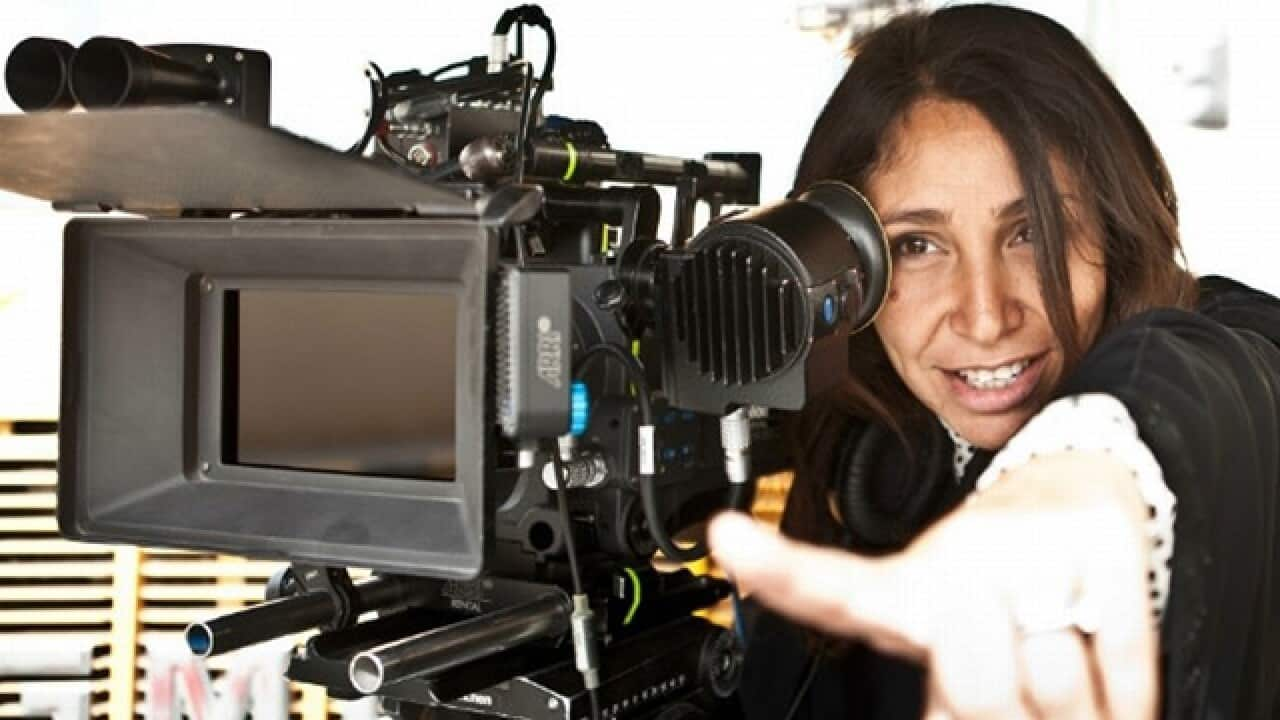Wadjda (2012), directed by Haifaa Al-Mansour, provides an intimate portrait of a young girl’s life in Saudi Arabia. The movie’s greatest achievement is a main character (played by Waad Mohammed) unbound by the society she lives in. She presses through multiple obstacles to pull her dreams into a tangible reality.
We are rarely given an insight into the lives of women in Saudia Arabia. They are covered by black veils (also called “abaya”) in public so they are indiscernible. Here Al-Mansour leads us as guests who have the rare opportunity to observe the lives of women. Wadjda is a beautiful character study that surprises the audience at every turn. In Wadjda the characters lift the veils that lie over their inner lives. We learn about women’s relationship to religion, creativity, family and, most importantly, to each other.
This is Waad Mohammed’s first film and she gives a natural and believable performance. Wadjda stands out from the girls around her because she has a voice she constantly uses. Women in Saudi Arabia have been forbidden from driving (though this is said to change imminently) and have to be driven around by men.
Wadjda’s mother (played by Reem Abdullah) is late and her driver scolds her. Wadjda fights back and accuses him of hypocrisy. Daughter rather than the mother takes the lead here. Wadjda’s desire for a bike is contrasted by the limitations placed on her by society. The bike stands as a symbol for her need for agency and authority over her life. Her teachers notice this and Wadjda is constantly sent to her headmistress’ office. She is told to be quiet because a woman’s “voice is private” and is also told to “cover [her] face”. She is also constantly discouraged from riding a bike by her friend, Abdullah (played by Abdullrahman Al Gohani) and her mother. Wadjda’s body, behaviour and intentions are constantly policed.
Her teachers notice this and Wadjda is constantly sent to her headmistress’ office. She is told to be quiet because a woman’s “voice is private” and is also told to “cover [her] face”. She is also constantly discouraged from riding a bike by her friend, Abdullah (played by Abdullrahman Al Gohani) and her mother. Wadjda’s body, behaviour and intentions are constantly policed.

From writer/director Haifaa Al-Mansour, ‘Wadjda’ is the first film shot entirely in Saudi Arabia. Source: SBS Movies
Despite this, Wadjda is fearless and lets nothing stand in her path. She uses her creativity and develops entrepreneurial skills to achieve her goal. She sells bands she has made to girls in school and cleverly charges people to deliver letters.
She jumps at the opportunity to raise the remaining funds by joining the Koran reading competition at school. Here, she plays on her teacher’s disapproval and uses it to her advantage – she promises to “change” and the headmistress easily falls into her trap. Despite this, Wadjda is not motivated primarily by personal desire because she is able to look beyond herself and help her mother in times of financial and emotional need.
Wadjda’s story is played against that of her mother’s. Her mother’s greatest feature is her beauty. She hopes to cut her hair but hesitates because of her husband’s preference for long hair. Could her beauty prevent her husband from re-marrying and keep their family unit intact?
The movie sets the possibilities presented by childhood against the harsh realities of adulthood.
The movie sets the possibilities presented by childhood against the harsh realities of adulthood. The scenes involving Wadjda and her friend, Abdullah are fun and hopeful. Around Abdullah she is free and completely herself. On the contrary, the scenes shared by Wadjda’s parents have a tense undercurrent.
Women are expected to marry young in Saudi Arabia. This is a society that practices polygamy so men can have multiple marriages. The constrictions that adulthood holds loom over Wadjda’s young identity. Would Wadjda have to face a similar fate to that of her mother’s?
There are clues throughout the film that Wadjda’s fearless character might not be stunted by expectations in the near future. Just look at the movie’s cinematography of urban areas and examine the light pastel colours such as beiges, light pinks and light oranges. The urban areas are not completely modernised.
There is an absence of large skyscrapers, high rise buildings or steel sculptures. The urban landscape lacks a clear definition. Women’s roles in Saudi Arabia are reinterpreted as the landscape modernises. Women can drive (after June 2018), vote (under male guardianship) and obtain highly specialised jobs in 2018. This is a big change from 2012! Further change is set to occur under “Saudi Vision 2030”.
Wadjda triumphs in the clear message it sends out. Women are ambitious and are constantly trying to remove the obstacles that bind them. We, as the audience are exposed to the inner lives of these female characters, lives that are completely secluded from the men. It is the exposure of this rich interiority that makes Wadjda a film about female liberation rather than female repression.
Watch 'Wadjda'
Tuesday 3 May, 7:40pm on SBS World Movies
Thursday 5 May, 2:00am & 10:10am on SBS World Movies
Thursday 5 May, 2:00am & 10:10am on SBS World Movies
Now streaming at SBS On Demand
PG
Saudi Arabia, 2012
Genre: Drama
Language: Arabic
Director: Haifaa Al-Mansour
Starring: Waad Mohammed, Abdullrahman Al Gohani, Reem Abdullah

MORE AT SBS:

‘Sorry We Missed You’ and the will to push on






